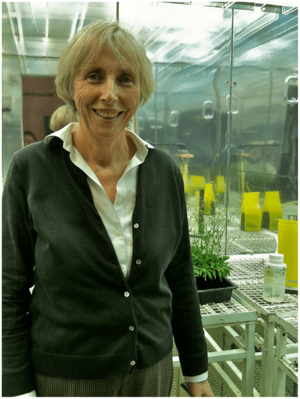Caroline Dean facts for kids
Quick facts for kids
Caroline Dean
|
|
|---|---|
 |
|
| Born |
Caroline Dean
2 April 1957 |
| Alma mater | University of York (BA, DPhil) |
| Known for |
|
| Spouse(s) | |
| Children | one son, one daughter |
| Awards |
|
| Scientific career | |
| Fields | |
| Institutions |
|
| Thesis | Investigations of genome expression in young wheat leaves (1983) |
Dame Caroline Dean, born on April 2, 1957, is a famous British plant scientist. She works at the John Innes Centre, a leading research institute. Her main goal is to understand how plants know when to make flowers. She studies how plants use signals from the environment, like cold weather, to decide when it's the right time to bloom.
Contents
Early Life and Education
Caroline Dean studied at the University of York. She earned her first degree, a Bachelor of Arts in Biology, in 1978. Later, in 1982, she completed her advanced degree, a PhD in Biology, also from the University of York.
Discovering Plant Secrets
Dr. Dean's research focuses on how plants control their genes. Genes are like instruction manuals inside every living thing. She studies how these instructions are turned on or off. This helps plants react to changes around them.
How Plants Know When to Flower
One of her biggest interests is something called vernalisation. This is how plants use a long period of cold to prepare for flowering. It's like the plant's way of remembering that winter has passed. This helps them bloom at the right time in spring.
Dr. Dean specifically studies a gene called FLC. This gene acts like a brake, stopping plants from flowering too early. When plants experience cold, the FLC gene gets "silenced." This means its instructions are temporarily turned off. Once FLC is quiet, the plant can start making flowers.
The Amazing Arabidopsis Plant
To understand these complex processes, Dr. Dean uses a small plant called Arabidopsis. This plant is like a superstar in plant science. It grows quickly and is easy to study. By understanding Arabidopsis, scientists can learn things that apply to many other plants, including important crops. Dr. Dean was one of the first scientists to show how useful Arabidopsis could be for research.
Awards and Achievements
Caroline Dean has received many important awards for her groundbreaking work. These awards show how much her discoveries have helped us understand plants.
- In 1999, she became a member of the European Molecular Biology Organization (EMBO).
- She was made a Dame Commander of the Order of the British Empire (DBE) in 2004. This is a very high honor in the United Kingdom.
- In 2004, she was also elected a Fellow of the Royal Society (FRS). This is a group of the most important scientists in the UK.
- She received the Genetics Society Medal in 2007.
- In 2016, she was awarded the Darwin Medal by the Royal Society. This was for her work on how plants sense temperature and adapt.
- She won the L'Oréal-UNESCO For Women in Science Award in 2018. This award celebrates women who have made amazing contributions to science.
- In 2020, she received the prestigious Wolf Prize in Agriculture. This award is given to people who have made major improvements in agriculture.
- Also in 2020, she was awarded the Royal Medal by the Royal Society.
Personal Life
Caroline Dean married Jonathan D. G. Jones in 1991. They have one son and one daughter.
 | Anna J. Cooper |
 | Mary McLeod Bethune |
 | Lillie Mae Bradford |

